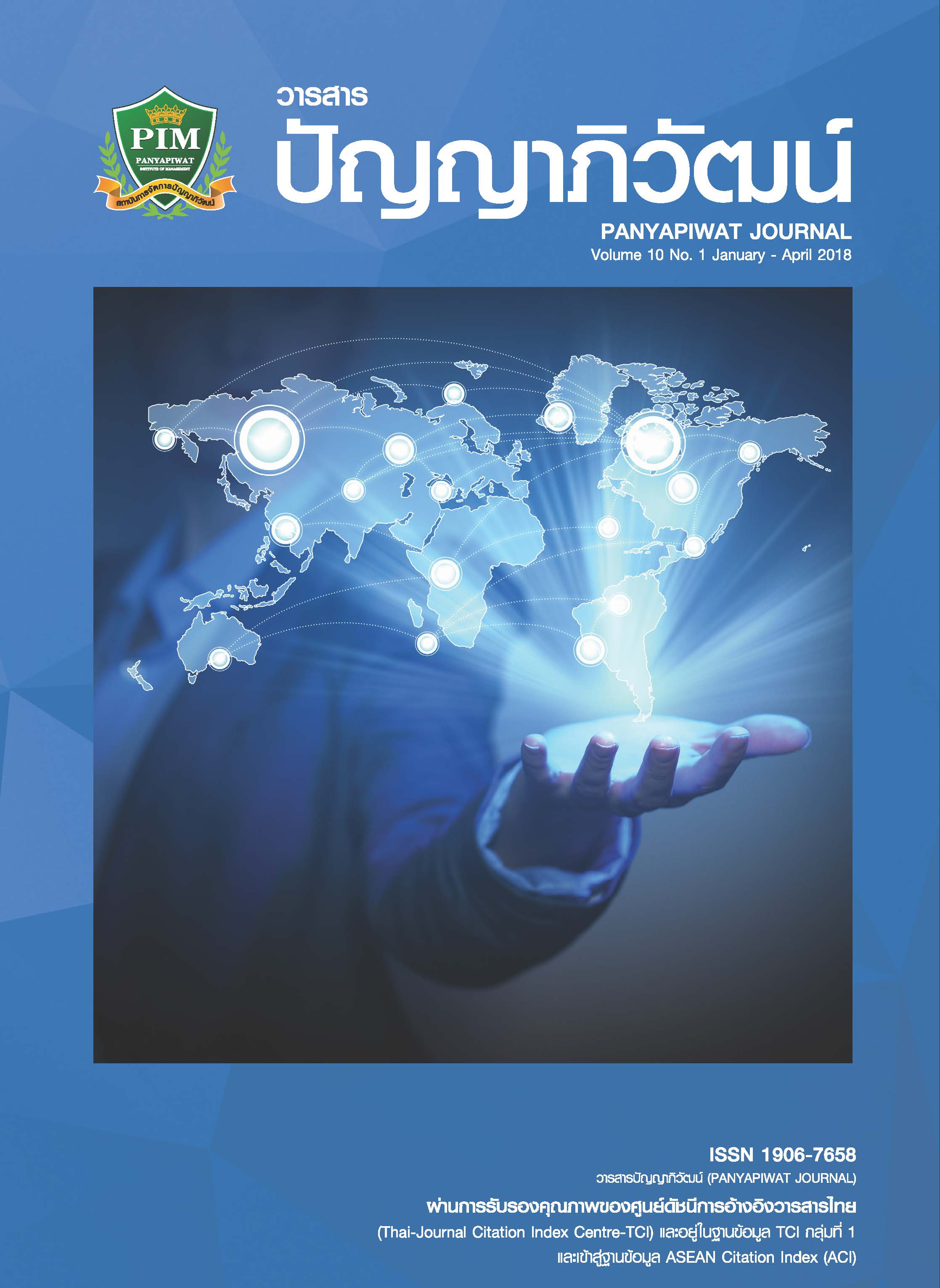การพัฒนาชุดกิจกรรมคณิตศาสตร์เพื่อเสริมสร้างความสามารถในการแก้ปัญหาอย่างมีจิตนิสัยทางคณิตศาสตร์ สำหรับนักเรียนชั้นประถมศึกษาปีที่ 6 โรงเรียนสาธิตแห่งมหาวิทยาลัยเกษตรศาสตร์ ศูนย์วิจัยและพัฒนาการศึกษา
Main Article Content
บทคัดย่อ
จิตนิสัยทางคณิตศาสตร์ เป็นการมองเห็นความสัมพันธ์ระหว่างเนื้อหาคณิตศาสตร์ต่างๆ และสามารถคิดเชื่อมโยงโครงสร้างความรู้ที่มีอยู่มาจัดการกับสถานการณ์หรือปัญหาเพื่อหาคำตอบได้อย่างมีประสิทธิภาพ โดยสามารถนำไปปฏิบัติอย่างสม่ำเสมอจนเกิดเป็นนิสัย งานวิจัยเรื่องนี้มีวัตถุประสงค์เพื่อพัฒนาชุดกิจกรรมคณิตศาสตร์เพื่อเสริมสร้างความสามารถในการแก้ปัญหาอย่างมีจิตนิสัยทางคณิตศาสตร์ และศึกษาผลการใช้ชุดกิจกรรมกับนักเรียนชั้นประถมศึกษาปีที่ 6 ของโรงเรียนสาธิตแห่งมหาวิทยาลัยเกษตรศาสตร์ ศูนย์วิจัยและพัฒนาการศึกษา ปีการศึกษา 2559 จำนวน 1 ห้องเรียน จำนวนนักเรียน 40 คน ผลการวิจัยพบว่า 1) ชุดกิจกรรมคณิตศาสตร์เพื่อเสริมสร้างความสามารถในการแก้ปัญหาอย่างมีจิตนิสัยทางคณิตศาสตร์ที่พัฒนาขึ้นมีประสิทธิภาพผ่านเกณฑ์ 80/80 และ 2) นักเรียนกลุ่มตัวอย่างมีความสามารถในการแก้ปัญหาอย่างมีจิตนิสัยทางคณิตศาสตร์สูงขึ้นอย่างมีนัยสำคัญทางสถิติที่ระดับ .05 และผลจากการบันทึกข้อมูลเชิงคุณภาพสะท้อนให้เห็นว่า นักเรียนส่วนหนึ่งยังมีข้อผิดพลาดในขั้นทำความเข้าใจปัญหาและขั้นตรวจสอบผล
Mathematical habit of mind focuses on ability to see the relationship between each mathematics content and to connect knowledge schemata to manage situations or solving problems effectively. This practice needs to be habituated. This research aimed to develop a mathematical activity package to enhance problem solving ability with mathematical habits of mind and its effects. The sample of this research consisted of 40 sixth grade students of Kasetsart University Laboratory School Center for Educational Research and Development in the academic year 2016. The results showed that (1) the efficiency of the developed mathematical activity package was higher than the 80/80 criterion; and (2) The experimental group student significantly increased their problem solving ability with mathematical habits of mind at the .05 level of statistical significance. Moreover, recorded qualitative data evince some students’ mistakes in understanding the problem and looking back steps.
Article Details
“ข้าพเจ้าและผู้เขียนร่วม (ถ้ามี) ขอรับรองว่า บทความที่เสนอมานี้ยังไม่เคยได้รับการตีพิมพ์และไม่ได้อยู่ระหว่างกระบวนการพิจารณาลงตีพิมพ์ในวารสารหรือแหล่งเผยแพร่อื่นใด ข้าพเจ้าและผู้เขียนร่วมยอมรับหลักเกณฑ์การพิจารณาต้นฉบับ ทั้งยินยอมให้กองบรรณาธิการมีสิทธิ์พิจารณาและตรวจแก้ต้นฉบับได้ตามที่เห็นสมควร พร้อมนี้ขอมอบลิขสิทธิ์บทความที่ได้รับการตีพิมพ์ให้แก่สถาบันการจัดการปัญญาภิวัฒน์หากมีการฟ้องร้องเรื่องการละเมิดลิขสิทธิ์เกี่ยวกับภาพ กราฟ ข้อความส่วนใดส่วนหนึ่งและ/หรือข้อคิดเห็นที่ปรากฏในบทความข้าพเจ้าและผู้เขียนร่วมยินยอมรับผิดชอบแต่เพียงฝ่ายเดียว”
References
Brahmawong, C. (2006). Handbook for Develop Educational Medias. Bangkok: Kurusapa Publishing Ladprao. [in Thai]
_______. (2008). Technology and Educational Medias. Bangkok: United Production. [in Thai] Costa, A. & Kallick, B. (2000). Habits of mind: A developmental series. Alexandria, VA: Association for Supervision and Curriculum Development.
Cuoco, A., Goldenberg, E. P. & Mark, J. (1996). Habits of mind: An organizing principle for a mathematics curriculum. Journal of Mathematical Behavior, 15(4), 375-402.
Jaiprong, C. (2011). A Mathematics Instructional Activities Adapting and Applying a variety of Problem Solving Strategies to enhance Ability to Solve Mathematical Problems on Functions for Mathayomsuksa IV Students. Master Thesis, M.Ed. (Mathematics), Srinakharinwirot University. [in Thai]
Johnson, R. (2012). Developing habits of mind for numeracy in a low-literacy classroom: a focus on attitudes. Retrieved May 22, 2016, from https://hdl.handle.net/11299/162763
Kaewkrajang, S. (2010). A Study of Mathematical Problem Solving Ability on Parllel Lines of Mathayomsuksa II Students Learning Through Group Process Activities. Master Thesis, M.Ed. (Secondary Education), Srinakharinwirot University. [in Thai]
Krainara, P. (2014). The Development of Mathematics Activity Packages to Encourage Problem Solving Ability on Ratio and Percentage for Mathayom Suksa Il Students, Ban-Kalisa School of Ra-ngae District, Narathiwat Primary Educational Service Area Office 3. Princess of Naradhiwas University Journal of Humanities and Social Sciences, 1(1), 55-66. [in Thai]
Lim, K H. & Selden, A. (2009). Mathematical habits of mind. Proceedings of the Thirty-first Annual Meeting of the North American Chapter of the International Group for the Psychology of Mathematics Education. Atlanta: Georgia State University.
Mahavijit, P. (2010). The Heart of Mathematics. The Magazine of Mathematics, 6(3), 51-53. [in Thai]
_________. (2016). Mathematical habits of mind. IPST Magazine, 44(201), 20-23. [in Thai]
Mark, J., Cuoco, A., Goldenberg, E. P. & Sword, S. (2010). Developing Mathematical Habits of Mind. Mathematics Teaching in the Middle School, 15(9), 505-509.
National Council of Teachers of Mathematics. (1991). Professional Standards for Teaching Mathematics. Reston, VA: NCTM.
Panich, V. (2012). Creation of Learning Method for Students in the 21 Century. Bangkok: Tathata Publication. [in Thai]
Pantaranontaka, K. (2008). The Effect of Using Mathematics Instructional Activity Packages with Thai Chess on Mathayomsuksa IV Students' Mathematical Reasoning Skills. Master Thesis, M.Ed. (Secondary Education), Srinakharinwirot University. [in Thai]
Papert, S. (1972). Teaching Children to Be Mathematicians Versus Teaching About Mathematics International Journal of Mathematical Education in Science and Technology, 3(3), 249-262.
Phiphitthakun, Y. (2002). Mathematics Teaching. Bangkok: Borpitt Printing. [in Thai]
Polya, G. (1985). How to Solve it: A New Aspect of Mathematical Method (2nd ed.). New York Doubleday and Company Garden City.
Saiyos, L. & Saiyos, A. (1995). Technique in Educational Research. Bangkok: Suviriyasarn. [in Thai]
Seeley, C. L. (2013). Mathematical Habits of Mind: Creating Doers of Mathematics. Retrieved August 1, 2017, from https://cdn2.hubspot.net/hub/239103/file-409784118-pdf/Seeley MCTM-Dec 2013-to post.pdf
__________.(2014). Smarter Than We Think: More Messages About Math, Teaching and Learning in the 21st Century. USA: Math Solutions.
Sinthapanon, S. (2010). Learning Innovation for Develop Youths' Quality. Bangkok: 9119 Technique Printing. [in Thai]
Thaikam, W. (2013). The Development of the Learning Activities Packages by Using Polya's Problem Solving Techniques and Problem Solving Strategies to Enhance the Students' Abilities Which are focused on Mathematical Problem Solving Skills with English Situation for Mattayomsuksa 1 Students Science and Mathematics English Program (SMEP). Master Thesis, M.Ed. (Science Education), Naresuan University. [in Thai]
The institute for the Promotion of Teaching Science and Technology. (2008). Mathematical Processes and Skills (2nd ed.). Bangkok: Kurusapa Publishing Ladprao. [in Thai] .
________.(2016). Research Report: Follow-up Study of Teaching and Learning in Science, Mathematics and Technology of Pratomsuksa 6 Teachers. Bangkok: IPST. [in Thai]
Thipkong, S. (2013). Problem Solving in Mathematics (2nd ed.). Bangkok: Kurusapa Publishing Ladprao. [in Thai]
Ugsonkid, S. (2012). Mathematical Problem Solving and Problem Posing. Bangkok Vista Interprint.[in Thai]
Vollrath, D. (2016). Developing Costa and Kallick's Habits of Mind Thinking for Students with a Learning Disability and Special Education Teachers. Ed.D. Theses & Dissertations (Special Education), Arcadia University.
Wongsaphan, M. (2017). The Development of Learning Activity Packages to Enhance Mathematical Process Skills by Using Local Learning Materials for Lower Secondary School Students. Journal of Education Naresuan University, 19(2), 71-82. [in Thai]

